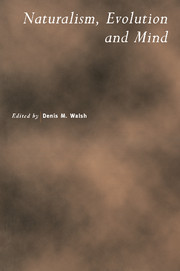Book contents
- Frontmatter
- Contents
- preface
- Notes on Contributors
- Editor's Introduction
- Mind the Adaptation
- Should Intentionality be Naturalized?
- Norms, History and the Mental
- What has Natural Information to do with Intentional Representation?
- Locke-ing onto Content
- The Evolution of Means-End Reasoning
- Rationality and Higher-Order Intentionality
- Theory of Mind in Non-Verbal Apes: conceptual issues and the critical experiments
- The Principle of Conservatism in Cognitive Ethology
- Domains, Brains and Evolution
- Evolution and the Human Mind: how far can we go?
- Index
Rationality and Higher-Order Intentionality
Published online by Cambridge University Press: 10 May 2010
- Frontmatter
- Contents
- preface
- Notes on Contributors
- Editor's Introduction
- Mind the Adaptation
- Should Intentionality be Naturalized?
- Norms, History and the Mental
- What has Natural Information to do with Intentional Representation?
- Locke-ing onto Content
- The Evolution of Means-End Reasoning
- Rationality and Higher-Order Intentionality
- Theory of Mind in Non-Verbal Apes: conceptual issues and the critical experiments
- The Principle of Conservatism in Cognitive Ethology
- Domains, Brains and Evolution
- Evolution and the Human Mind: how far can we go?
- Index
Summary
Rationality and the Mental
According to the rationality thesis, the possession of propositional attitudes is inextricably tied to rationality. How in this context should we conceive of rationality? In one sense, being rational is contrasted with being non-rational, as when human beings are described as rational animals. In another sense, being rational is contrasted with being irrational. I shall call rationality in this latter sense evaluative rationality. Whatever else it might involve, evaluative rationality surely has to do with satisfying requirements of rationality such as, presumably, the following:
That one avoid inconsistency in beliefs.
That one not adopt new beliefs unless what one knows entails or is evidence for the truth of those beliefs.
That one not have øing as a goal yet do nothing necessary for one to ø. (Means/end requirement.)
I take it that the usually intended reading of the rationality thesis interprets ‘rationality’ to mean evaluative rationality. The claim, then, is that if one has propositional attitudes then one must be, to some degree, evaluatively rational. In other words, there are limits to how far a subject of propositional attitudes can fall short of what evaluative rationality requires. What reason is there to think that the rationality thesis is true?
A crucial consideration concerns the individuation of content. Suppose that within the space of a short conversation Fred makes some utterances, in English, such that were we to take them at face value we would ascribe to him both the belief that Edinburgh is to the east of Glasgow and the belief that Glasgow is to the east of Edinburgh.
- Type
- Chapter
- Information
- Naturalism, Evolution and Mind , pp. 179 - 198Publisher: Cambridge University PressPrint publication year: 2001



